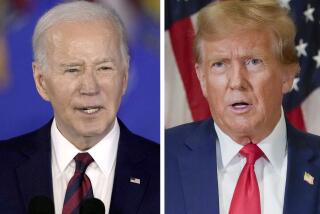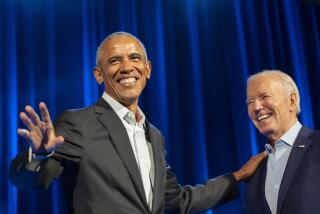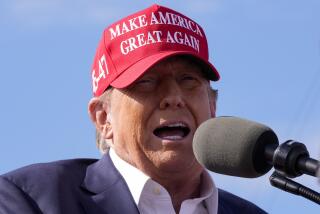Bush Campaign to Keep Its War Chest Lid Closed
- Share via
WASHINGTON — By the time President Bush ends an address to the Republican Party’s annual black-tie, fund-raiser gala here tonight, the GOP expects to be $10 million richer, thanks in part to an unprecedented number of $2,000-per-head donors, including many first-time contributors.
And as the Republican campaign coffers swell, so does the suspense over how, and when, Bush and his party intend to spend the tens of millions of dollars they are amassing for the 2004 elections.
This much is certain: After considerable internal debate, the Bush-Cheney campaign has decided to sit tight, at least for now, on the roughly $80 million it has raised -- and press toward its stated donation goal of $170 million to $200 million while waiting for a Democratic presidential nominee to emerge early next year. Karl Rove, the president’s top political tactician, acknowledged Tuesday that campaign strategists have recently discussed when to launch Bush ads. But he insisted those talks were not inspired by the drop in Bush’s job-approval ratings -- a decline sparking speculation that advertisements touting the president could soon surface.
“We have discussed an appropriate point [to launch political ads], but the idea of doing that now is just totally not true,” Rove said.
Some independent analysts said Tuesday that while a case could be made for the Bush campaign to launch a round of positive advertising, the arguments for holding fire seemed more persuasive.
An early advertising blitz would likely erode the above-the-fray aura that Bush is cultivating -- even as he travels around the country in a march toward a fund-raising record for a presidential campaign. He holds the current record, having raised $101 million in 2000.
Stuart Rothenberg, a Washington-based political analyst, said it is unlikely many voters would pay much attention to a spate of pro-Bush ads. “Right now, people are focusing on the [baseball playoffs], Halloween, Thanksgiving and Christmas.”
Rothenberg noted that as president, Bush “can dictate the nature of the public discourse -- on the economy, on Iraq and on the direction of the nation,” without relying on paid political messages.
He said early advertising would “make every Bush decision seem like a political decision ... and make it hard [for the White House] to keep a straight face that they’re not in a campaign mode.”
The Bush-Cheney reelection campaign is eschewing federal matching funds for the primary campaign, thereby allowing it to avoid the spending limits that come with accepting such public funds. But the campaign intends to accept federal funds during the general election campaign.
If it continues to husband its growing campaign treasury, the Bush-Cheney ticket would be able to let loose a barrage of ads early next year that could go largely unanswered for several months once the winner of the Democratic race emerges. Given that schedule of primaries, the Democratic race is expected to be decided by early March.
In the 1996 campaign, President Clinton employed a similar tactic with great success. Early in the year, his campaign launched an extensive advertising campaign and kept it up after then-Sen. Bob Dole of Kansas emerged as the GOP presidential pick.
By then, Dole’s campaign was virtually penniless as a result of the spending to win the GOP primary fight. He had to wait until he was officially nominated in August, before he had access to federal funds to fight back. The eventual Democratic nominee next year may well end up in similar straits. The 2004 Democratic National Convention is scheduled for the end of July.
Last month, Bush-Cheney operatives spent time with Dole’s strategists to review their 1996 experience. Ultimately, according to one source, the Bush aides “decided to hold the line” on beginning ads now.
“My sense is, the Bush guys have too much pride. Going on the air this early would amount to an admission of failure,” he said.
In a series of recent polls, the president’s job-approval rating has fallen to its level before the Sept. 11 terrorist attacks. Bush’s response to the attacks sent his ratings soaring.
A New York Times/CBS poll Friday reported that by a majority of 56% to 37%, the public was uneasy about his economic agenda and that support for his foreign policy was now virtually split, with 45% disapproving and 44% in favor.
The 2004 election cycle is the first to take place under the new campaign finance reform legislation, which outlawed unlimited “soft money” contributions that came mainly from organizations and corporations, while doubling the limit on individual contributions to $2,000.
One result is that tonight’s Republican National Committee gala will rake in less than one-third of the amount raised at the same event a year ago. Still, there is no shortage of campaign dollars gushing into the system despite the reform legislation.
The Democratic Senatorial Campaign Committee, for instance, says it has raised $16 million so far this year, including a 60% increase in contributions from individuals.
Its GOP counterpart, the National Republican Senatorial Committee raised $21 million in the same period.
In the House, the National Republican Campaign Congressional Committee has raised $56 million; and the Democratic Congressional Campaign Committee has collected $20 million.
The RNC has raised $76.6 million to date, thanks in part to more than 1 million first-time contributors; The DNC has raised $30 million so far this year.
In addition, “backdoor committees” are funneling millions of dollars into various campaigns by claiming a tax-exempt status to avoid regulation by state or federal election authorities, according to critics.
More to Read
Get the L.A. Times Politics newsletter
Deeply reported insights into legislation, politics and policy from Sacramento, Washington and beyond. In your inbox twice per week.
You may occasionally receive promotional content from the Los Angeles Times.










